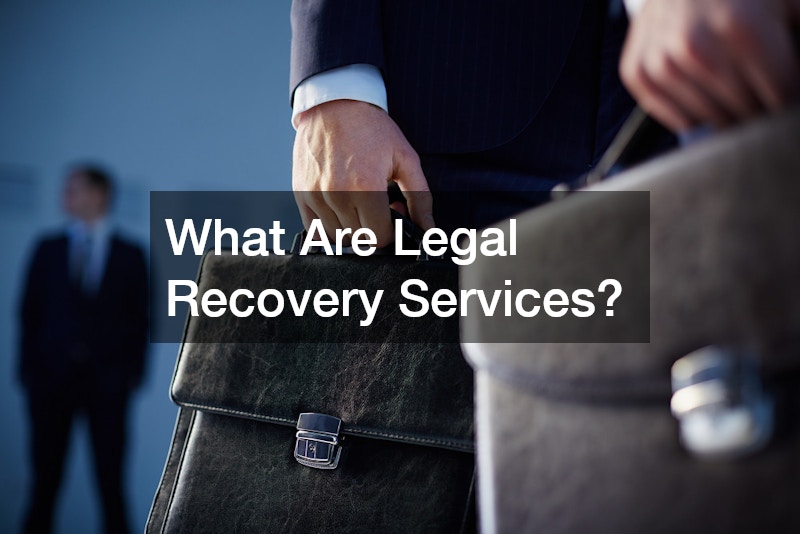
Navigating the complexities of today’s legal system can be daunting without the right guidance. Whether you’re dealing with personal legal challenges, safeguarding your business, or addressing family disputes, effective use of legal services is essential. From ensuring your rights are protected to maximizing the benefits of professional expertise, understanding how to get the most out of your legal services is critical to achieving successful outcomes. This guide explores all facets of legal recovery, offering practical insights for individuals and businesses alike.
What Are Legal Recovery Services?

Definition and Overview
Legal recovery services are designed to protect individuals and businesses in situations where they face legal or financial challenges. These services focus on reclaiming assets, securing justice, and enforcing legal rights. For example, an estate planning lawyer may assist families in ensuring assets are distributed according to their wishes, while a personal injury law firm can help individuals recover damages after an accident. Regardless of the specific need, legal recovery services are a lifeline in navigating the legal landscape.
Importance of Legal Recovery
The significance of legal recovery cannot be overstated. Whether you’re facing a complex financial situation or dealing with a workplace injury, the guidance of professionals ensures that you are treated fairly and equitably. Legal recovery services safeguard your interests by addressing disputes, providing clarity on legal obligations, and securing favorable outcomes. Without these resources, you may face unnecessary risks, delays, or even losses that could have been prevented with the right legal advice.
Types of Legal Recovery Services
Legal recovery encompasses a broad spectrum of services tailored to meet specific challenges. These include:
- Financial recovery with the help of bankruptcy attorneys for situations like Chapter 7 bankruptcy.
- Workplace claims are handled by workers comp lawyers who specialize in compensation for injuries or illnesses incurred on the job.
- Family disputes are navigated by a local divorce lawyer, including processes like divorce mediation.
- Property issues are addressed by condemnation lawyers who protect property owners during eminent domain cases.
- Estate disputes are resolved by trust attorneys to ensure fair outcomes in wills and trusts.
Each of these areas requires specialized expertise, underscoring the importance of choosing the right legal professionals for your unique needs.
How to Choose the Right Legal Services for Recovery
Assessing Your Needs
Understanding your specific legal needs is the first step to finding the right support. Are you navigating financial challenges requiring bankruptcy attorneys? Do you need help recovering compensation after a workplace injury? Identifying the area of expertise you require ensures that you engage a professional who can provide targeted advice. For example, if your goal is to protect your estate, consulting an estate planning lawyer with extensive experience in asset management and inheritance planning is key.
Evaluating Credentials and Experience
Once you’ve identified your needs, focus on evaluating the credentials and experience of potential legal professionals. Research their qualifications, areas of expertise, and success rates in cases similar to yours. An experienced personal injury law firm will have the resources and strategies needed to maximize compensation for injuries, while a skilled local divorce lawyer will understand the nuances of family law, ensuring your interests are protected.
Considering Cost and Fees
The cost of legal services is a significant consideration for most clients. While affordability is important, remember that cheaper services may not always provide the quality needed for successful outcomes. Discuss fee structures openly, whether hourly rates, flat fees, or contingency arrangements, to avoid surprises later. Whether working with trust attorneys for estate disputes or a bail bondsman for immediate legal challenges, understanding costs upfront ensures financial clarity.
What Questions Should You Ask Your Legal Provider?

Understanding the Scope of Services
Asking the right questions about the scope of services helps align your expectations with your lawyer’s capabilities. For example, if you engage a personal injury law firm, ask how they plan to approach your case, what evidence is required, and what outcomes are realistic. A comprehensive understanding of their role and responsibilities ensures a smoother working relationship.
Clarifying Communication Expectations
Effective communication is vital to a successful partnership with your legal provider. Ask about preferred methods of contact, response times, and the frequency of updates. For instance, a workers comp lawyer should provide regular updates on the status of your claim, ensuring you are informed every step of the way.
Setting Timeline and Milestones
Understanding the timeline of your case helps manage expectations and reduces stress. Discuss potential milestones with your attorney, whether it’s a Chapter 7 bankruptcy filing or progress during divorce mediation. Knowing when to expect resolutions helps you plan accordingly and ensures accountability.
How to Prepare for a Legal Consultation
Gathering Necessary Documents
Preparation is crucial for a productive legal consultation. Gather all relevant documents, such as financial records, medical reports, or contracts, depending on your case. For a local divorce lawyer, ensure you bring marriage certificates, proof of assets, and child custody agreements to streamline the discussion and provide a clear picture of your situation.
Formulating Your Questions and Concerns
Prepare a list of questions and concerns before meeting with your lawyer. This preparation ensures you cover all critical aspects of your case, from cost inquiries to potential outcomes. Whether it’s clarifying jargon related to condemnation lawyers or discussing payment plans with bankruptcy attorneys, having a list ensures no detail is overlooked.
Understanding Legal Jargon
Legal terminology can be overwhelming for clients unfamiliar with the field. Take time to research common terms relevant to your case. For example, understanding what Chapter 7 bankruptcy entails or the purpose of divorce mediation allows you to follow conversations more effectively and make informed decisions.
How Legal Recovery Services Can Protect Your Interests

Mitigating Risks
Legal professionals are instrumental in identifying and mitigating risks that could jeopardize your case. For example, workers comp lawyers ensure that insurance companies don’t undervalue your claim, while trust attorneys protect your estate from potential disputes or mismanagement. These measures safeguard your rights and assets.
Navigating Legal Complexities
Legal recovery services simplify the intricate processes involved in cases. From understanding the legal framework to strategizing for success, professionals guide you through every step. A bail bondsman, for instance, provides immediate assistance in securing release, while condemnation lawyers navigate complex government negotiations on your behalf.
Enforcing Your Rights
Your lawyer serves as an advocate, ensuring your rights are respected and enforced. Whether recovering damages through a personal injury law firm or ensuring a fair division of property with a local divorce lawyer, having expert representation is essential for achieving justice.
What Are Common Challenges in Legal Recovery?
Dealing with Non-Cooperative Parties
Non-cooperative parties can create significant obstacles in legal recovery. Trust attorneys, for example, often encounter resistance in estate disputes when beneficiaries disagree on terms. Skilled legal professionals mediate effectively to resolve such conflicts, ensuring fair outcomes.
Overcoming Bureaucratic Hurdles
Navigating bureaucratic processes can be time-consuming and frustrating. Whether filing claims with workers comp lawyers or dealing with government agencies through condemnation lawyers, professional guidance is invaluable in overcoming these challenges and expediting resolutions.
Handling Financial Limitations
Financial constraints can hinder access to quality legal services. Discussing flexible payment plans or seeking assistance from pro bono programs can help alleviate financial stress. For example, many bankruptcy attorneys offer sliding-scale fees to make their services more accessible.
How Technology Is Transforming Legal Services

The Rise of Legal Tech Solutions
Technology is reshaping the legal industry by offering innovative tools and platforms for clients and professionals. Condemnation lawyers, for instance, use advanced software to analyze property data and improve case strategies, while online portals provide clients with real-time updates.
Benefits of Online Legal Services
Online legal services offer unmatched convenience and accessibility. From consulting with divorce mediation experts to filing for Chapter 7 bankruptcy, digital platforms enable clients to engage with legal professionals without the need for in-person meetings, saving time and resources.
Challenges of Digital Transformation
Despite its benefits, digital transformation in legal services poses challenges, such as maintaining data security and ensuring effective communication. Balancing these aspects is crucial for lawyers to provide a seamless client experience while safeguarding sensitive information.
How to Effectively Communicate with Your Legal Team
Establishing Preferred Communication Channels
Agreeing on preferred communication channels ensures smooth interactions with your legal team. Whether you prefer email updates, phone calls, or virtual meetings, aligning with your lawyer’s communication style, be it a bail bondsman or workers comp lawyer, fosters efficiency.
Balancing Professionalism and Approachability
A successful lawyer-client relationship combines professionalism with approachability. Open dialogue encourages transparency and trust, enabling your legal team to represent you effectively.
Maintaining Transparency
Transparency is the cornerstone of any successful legal partnership. Share all relevant details with your lawyer, whether it’s about financial circumstances during Chapter 7 bankruptcy or personal concerns during divorce mediation. Full disclosure ensures accurate advice and better outcomes.
advice.
The Role of Legal Recovery in Business Operations
Streamlining Dispute Resolution
For businesses, legal recovery services play an integral role in resolving disputes efficiently. A bail bondsman may provide immediate support in criminal matters, while trust attorneys help resolve corporate trust disputes that impact operations.
Ensuring Compliance and Risk Management
Legal experts assist businesses in maintaining compliance with regulations and managing risks effectively. From workplace claims handled by workers comp lawyers to property issues managed by condemnation lawyers, these services support operational stability.
Supporting Financial Stability
Proactive legal services, such as those provided by an estate planning lawyer, can safeguard financial stability by planning for future contingencies. Similarly, engaging with a personal injury law firm ensures fair compensation for workplace injuries that might otherwise strain business resources.
How to Evaluate the Success of Your Legal Recovery Efforts
Reviewing Results Against Objectives
Assessing whether your legal recovery efforts met initial objectives is crucial. Was your divorce mediation successful in reaching an amicable resolution? Did your workers comp lawyer secure adequate compensation? Reflecting on these outcomes helps gauge success.
Gathering Feedback and Testimonials
Feedback from other clients and testimonials can provide valuable insights into the quality of legal services. These reviews help refine your approach and guide future interactions with legal professionals.
Learning and Improving Future Interactions
Every legal experience offers lessons for future cases. Whether it’s better preparation for consultations or improved communication with your local divorce lawyer, continuous learning ensures more effective outcomes in subsequent legal matters.
The Future of Legal Recovery Services: Trends and Innovations
As the legal industry evolves, new trends and innovations are shaping the way legal recovery services operate. These advancements aim to improve accessibility, efficiency, and client satisfaction while addressing the challenges posed by an increasingly complex legal landscape. Understanding these trends can help individuals and businesses make informed decisions when engaging legal professionals.
Increased Use of Artificial Intelligence
Artificial Intelligence (AI) is revolutionizing legal recovery by automating time-consuming tasks and enhancing decision-making. AI-powered tools can analyze vast amounts of legal data, predict case outcomes, and assist lawyers in preparing stronger cases. For instance, bankruptcy attorneys may use AI to assess financial data and identify the best strategies for debt relief. Similarly, workers comp lawyers can leverage AI to review claim documents more efficiently, speeding up the resolution process.
The Expansion of Virtual Legal Services
The COVID-19 pandemic accelerated the adoption of virtual legal services, a trend that shows no signs of slowing down. Today, clients can consult with personal injury law firms, local divorce lawyers, and even trust attorneys from the comfort of their homes. Video conferencing, online document sharing, and digital signatures have streamlined client interactions, making legal assistance more accessible than ever. This shift to virtual services also benefits rural or underserved communities, where access to specialized legal professionals may have previously been limited.
Focus on Client-Centric Technology
Innovations are increasingly focused on improving the client experience. Online portals and mobile apps now allow clients to track the progress of their cases, access important documents, and communicate with their legal teams in real-time. For example, a condemnation lawyer might use an app to keep property owners updated on government negotiations, ensuring transparency throughout the process.
Emphasis on Alternative Dispute Resolution
Alternative dispute resolution (ADR) methods, such as mediation and arbitration, are gaining popularity as a way to avoid lengthy court battles. Legal professionals, including divorce mediation experts and trust attorneys, are increasingly adopting ADR to resolve conflicts more amicably and cost-effectively. This trend aligns with clients’ growing preference for less adversarial and more collaborative approaches to legal recovery.
By embracing these trends and innovations, legal recovery services are becoming more adaptable, efficient, and client-focused. Staying informed about these developments can help individuals and businesses choose legal providers who are equipped to meet their evolving needs.
Conclusion
Legal recovery services provide essential support for individuals and businesses facing challenges. From reclaiming assets and navigating disputes to enforcing rights and ensuring compliance, these services simplify the complexities of the legal landscape. By choosing the right professionals, understanding the scope of their expertise, and maintaining effective communication, you can maximize the benefits of legal services and secure favorable outcomes. Whether seeking guidance from bankruptcy attorneys or engaging a personal injury law firm, investing in expert legal recovery is a step toward safeguarding your interests and achieving peace of mind.
